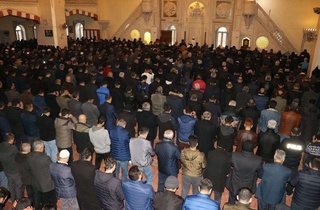Ramadan is the ninth month of the Islamic calendar, observed by Muslims worldwide as a month of fasting (sawm), prayer, reflection, and community. A commemoration of Prophet Muhammad's first revelation, the annual observance of Ramadan is regarded as one of the Five Pillars of Islam and lasts twenty-nine to thirty days, from one sighting of the crescent moon to the next.
Fasting from sunrise to sunset is fard (obligatory) for all adult Muslims who are not acutely or chronically ill, traveling, elderly, pregnant, breastfeeding, diabetic, or menstruating.
Allah the Almighty said: “The month of Ramadan [is that] in which was revealed the Qur'an, a guidance for the people and clear proofs of guidance and criterion. So, whoever sights [the new moon of] the month, let him fast it; and whoever is ill or on a journey - then an equal number of other days. Allah intends for you ease and does not intend for you hardship and [wants] for you to complete the period and to glorify Allah for that [to] which He has guided you, and perhaps you will be grateful.” (Surah Al-Baqarah, 185)
Allah's Messenger Prophet Muhammed (PBUH) said: “The month of Ramadan is a blessed month. Allah has made you obligatory the fasting of Ramadan. When the month of Ramadan starts, the gates of heaven are opened and the gates of Hell are closed. There is a night in that month that is worth more than a thousand months. Whoever is deprived of the deed of that night [night of al-Qadr] is considered to be deprived of all deeds.” (Nesai)
The month of Ramadan is the month of giving. Giving goods to the needy, giving time to worship and religious services, and sacrificing life on the path of Allah. The month of Ramadan is giving authority to Allah, giving heart to the Prophet and believers, giving brain to the science, knowledge, and wisdom.
The month of Ramadan is the month of entering an intensive prayer program to get closer to the Lord of man. There is almost all kinds of worship in this intensive program. The main aim of worship is to be a decent human being.
"…Indeed, prayer prohibits immorality and wrongdoing, and the remembrance of Allah is greater…" (Al-Qur'an: al-Ankabut 45). "O you who have believed, decreed upon you is fasting as it was decreed upon those before you that you may become righteous," (Al-Qur'an: al-Baqarah-183). Take, [O, Muhammad], from their wealth a charity by which you purify them and cause them to increase, and invoke [Allah's blessings] upon them. Indeed, your invocations are reassurance for them…" (Surah al-Tawbah-103).
Therefore, "the month of Ramadan is the month of morality" can be said. But there is no time for morality, such as worship in Islam. Islam wants us to have good morals for life and every moment.
Our Prophet (Sallallahu Alayhi Vesellem) says: "Who does not give up the bad words and actions, Allah does not need him-her to stay thirsty or hungry [fasting]."(Bukhari).
Allah Taâla divides people into two in the Surah al-Layl; those who give and those who do not give. Those who give access ease while those who do not give reach difficulty. “As for he who gives and fears Allah, and believes in the best [reward], We will ease him toward ease. But as for he who withholds and considers himself free of need, and denies the best [reward], We will ease him toward difficulty.” (Al-Qur'an: al-Layl-5, 10)
Therefore, the month of Ramadan is the month of giving; to give the goods to the poor and needy, to give time and life to worship and Islamic services, to give his life in the way of Allah, to give his position for the sake of Islam, to give the heart to Allah, His Messenger, and believers, to give mind to the science, knowledge, and wisdom. (ILKHA)



 Güncel
Güncel
 Dünya
Dünya
 Dünya
Dünya
 Spor
Spor
 Spor
Spor
 Dünya
Dünya
 Güncel
Güncel
 Güncel
Güncel
 Dünya
Dünya
 Dünya
Dünya





